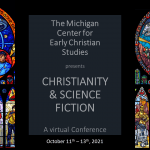Two new calls for papers that will likely be of interest to some blog readers:
Imaging Peace: Care-full Non-violence in Contemporary Sci-fi Narratives
In literature and popular culture, the non-violent approach is vastly underrepresented as a viable philosophy. This is problematic because the stories we tell shape the imaginary we live out of. Part of the reason the pacifist position seems so untenable is precisely because it remains so unimagined. One thinks of the so-called canon with its repertoire of violent heroes: Homer, Shakespeare, Milton, Arthurian legend. Even today’s popular “canon” features heroes who consistently solve problems through violence: the Marvel Cinematic Universe, DC Comics’ films, the John Wick series, and the classic, decade-spanning Alien franchise. The myth of redemptive violence continues unabated.
With the increasing popularity of the science fiction and fantasy genres, the narratives of the future are written in the texts of popular culture today. Already a tradition within some feminist science fiction (think Octavia Butler or Ursula LeGuin), other sci-fi texts also subvert the violence-as-assumed-solution position, as does Douglas Adams’ Hitchhiker’s Guide comedic franchise, James White’s character-driven Sector General series, or the BBC’s Good Samaritan Dr. Who, on the air since 1963.
We welcome papers that identify, describe, and analyze sci-fi texts that undertake the task of imaging a peaceful future of care instead of domination and conquest or offer modes of non-violent resistance against power. These texts may include graphic novels, films, novels, comics, and sci-fi from different periods and cultures that offer an alternative, non-violent vision of our future.
Angelica Maria DeAngelis [email protected]
Benjamin Crace [email protected]
Kheiriyeh Ahmadi [email protected]
Here is the second one:
Extrapolation: Special Issue on Speculative Fiction’s Intersections with Posthumanism and New Materialism
Extrapolation: Special Issue on Posthumanism and New Materialism
Extrapolation invites papers for a special issue investigating how speculative fiction, broadly conceived, dramatizes the tensions between the material limitations of the body and efforts to think beyond the human subject in posthumanism and new materialism. Taking our cues from contemporary authors like Jeff VanderMeer, Nalo Hopkinson, Caitlín Kiernan, Kathe Koja, Ken Liu, and China Miéville, we will examine how experimentation with form serves to articulate human practices for enduring and even flourishing in our extra-human reality. We are particularly invested in the ways speculative texts critique the centrality of the human while remaining attentive to the lived experience of the material body as it responds to ecological, technological, and economic demands that exceed human capacities of understanding.
Despite its modest aim to investigate thought and life that operates beyond the boundaries of enlightenment humanism, the field of the critical posthumanities often employs a rhetoric of extremes that invites us to abolish, expunge, contort, challenge, and undo the category of the human entirely. Yet, this expansive model of posthuman(ist) thought is often haunted by bodies, environments, and matter that resist being tamed by intellectual abstraction. Concomitantly, the turn to new materialism takes up problems of inter-relation and ecological co-constitution, offering ethical practices for coping with threats posed by the Anthropocene. Aiming to think more expansively than anthropocentrism allows, new materialist discourse disavows the human subject as the agent of our world to describe, instead, how agency—or animacy—is distributed beyond the human. While critical posthumanism and new materialism invite us to escape the human subject via discursive abstraction and capacious imaginings, we are still left grappling with the material costs extracted/exacted upon lives and matter imbricated in systems whose scales outstrip human perception. As an increasing amount of SF reminds us, climate change, ubiquitous computing, and globalized capitalism all operate beyond human apprehension but nonetheless suffuse and subtend what we refer to as human life, leaving us to ask: How might SF help us imagine an ethics beyond the human that maintains space for human agency and accountability? How might it help us critique humanism while refusing to abdicate responsibility for human and nonhuman suffering? How might SF help us cope in a world of ever-increasing complexity, entanglement, and precarity?
Potential topics might include:
- Film, television, games, and other SF media that offer innovative ways to think-with posthumanist and new materialist frameworks.
- SF’s intersection(s) with critical race theory, disabilities studies, queer theory, animality studies, and/or trauma theory in relation to posthumanism and new materialism.
- Questions of difference and materiality as they appear in overlooked or emerging SF texts, authors, or movements that might reshape the tensions between posthumanism and new materialism.
- Genealogies of critical theory and genre fiction: periodizing eras of posthuman SF and/or new materialist SF.
- Representations of ecological transformation and subsequent refugeeism.
- New categories for political collectivity being mapped in SF that challenge the centrality of the “category of the human.”
- Possible futures in SF that do not reduce to humanist categories of utopia or dystopia.
- How SF reformulates issues at the crux of “reform versus abolition” debates—policing, the military, gun control, anti-abortion legislation—and their ties to State definitions of “the human” or human rights.
- How the need to imagine beyond the human alters narrative form, specifically, the novel and narrative cinema.
Please submit inquiries and/or 300-word abstracts, working bibliographies, and brief CVs electronically as MS Word attachments to guest editors Tony M. Vinci ([email protected]) or John Landreville ([email protected]) by October 31st, 2021.
Accepted articles should be between 6000 and 8000 words in length, including Works Cited, and prepared in accordance with Extrapolation’s style requirements. Complete article submissions will be due by May 1st, 2022.
from cfp – theory https://ift.tt/3eqi0R4













